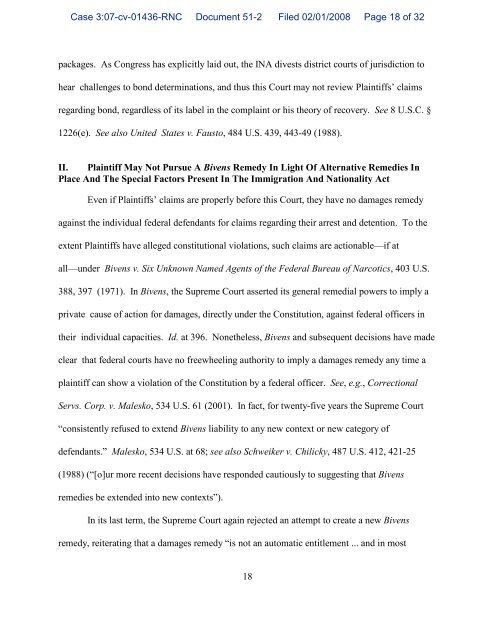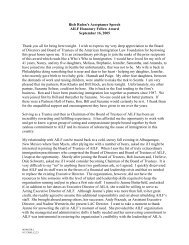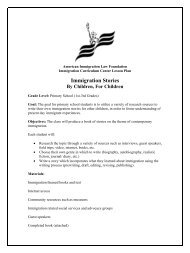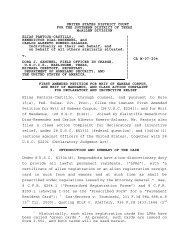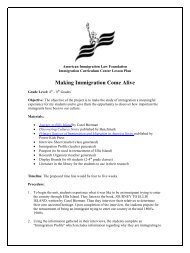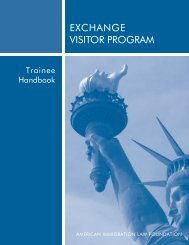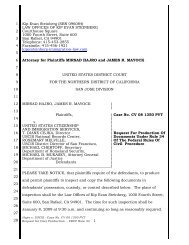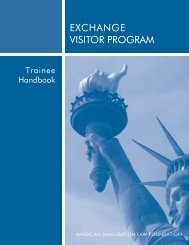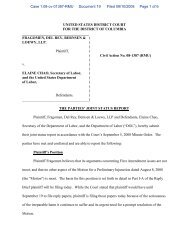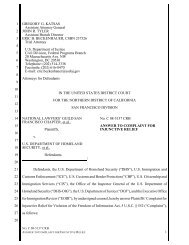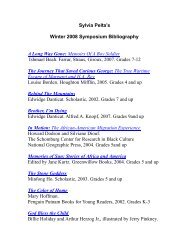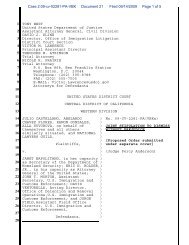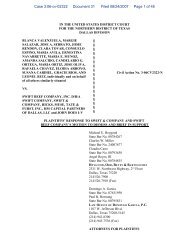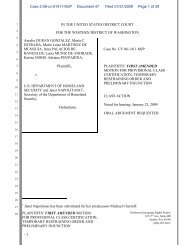Defendants' Motion to Dismiss for Lack of Subject Matter Jurisdiction
Defendants' Motion to Dismiss for Lack of Subject Matter Jurisdiction
Defendants' Motion to Dismiss for Lack of Subject Matter Jurisdiction
- No tags were found...
Create successful ePaper yourself
Turn your PDF publications into a flip-book with our unique Google optimized e-Paper software.
Case 3:07-cv-01436-RNC Document 51-2 Filed 02/01/2008 Page 18 <strong>of</strong> 32packages. As Congress has explicitly laid out, the INA divests district courts <strong>of</strong> jurisdiction <strong>to</strong>hear challenges <strong>to</strong> bond determinations, and thus this Court may not review Plaintiffs’ claimsregarding bond, regardless <strong>of</strong> its label in the complaint or his theory <strong>of</strong> recovery. See 8 U.S.C. §1226(e). See also United States v. Faus<strong>to</strong>, 484 U.S. 439, 443-49 (1988).II. Plaintiff May Not Pursue A Bivens Remedy In Light Of Alternative Remedies InPlace And The Special Fac<strong>to</strong>rs Present In The Immigration And Nationality ActEven if Plaintiffs’ claims are properly be<strong>for</strong>e this Court, they have no damages remedyagainst the individual federal defendants <strong>for</strong> claims regarding their arrest and detention. To theextent Plaintiffs have alleged constitutional violations, such claims are actionable—if atall—under Bivens v. Six Unknown Named Agents <strong>of</strong> the Federal Bureau <strong>of</strong> Narcotics, 403 U.S.388, 397 (1971). In Bivens, the Supreme Court asserted its general remedial powers <strong>to</strong> imply aprivate cause <strong>of</strong> action <strong>for</strong> damages, directly under the Constitution, against federal <strong>of</strong>ficers intheir individual capacities. Id. at 396. Nonetheless, Bivens and subsequent decisions have madeclear that federal courts have no freewheeling authority <strong>to</strong> imply a damages remedy any time aplaintiff can show a violation <strong>of</strong> the Constitution by a federal <strong>of</strong>ficer. See, e.g., CorrectionalServs. Corp. v. Malesko, 534 U.S. 61 (2001). In fact, <strong>for</strong> twenty-five years the Supreme Court“consistently refused <strong>to</strong> extend Bivens liability <strong>to</strong> any new context or new category <strong>of</strong>defendants.” Malesko, 534 U.S. at 68; see also Schweiker v. Chilicky, 487 U.S. 412, 421-25(1988) (“[o]ur more recent decisions have responded cautiously <strong>to</strong> suggesting that Bivensremedies be extended in<strong>to</strong> new contexts”).In its last term, the Supreme Court again rejected an attempt <strong>to</strong> create a new Bivensremedy, reiterating that a damages remedy “is not an au<strong>to</strong>matic entitlement ... and in most18


